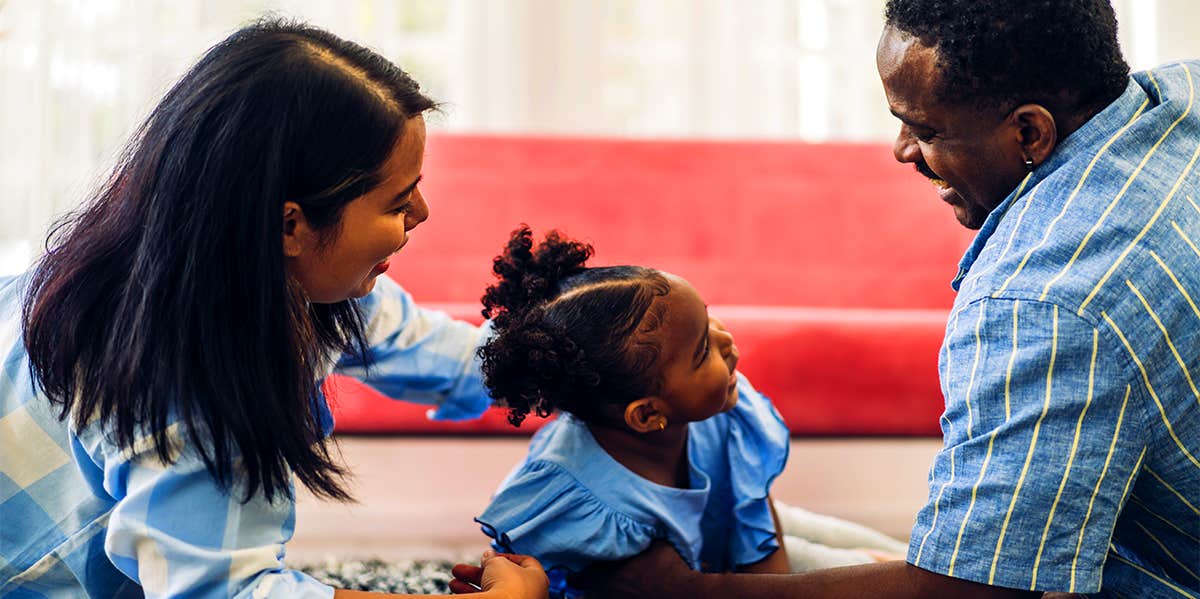18 Things Every Child Needs To Hear From Their Parents
What you say makes all the difference, and sometimes you need a little help knowing where to start.
 Art_Photo / Shutterstock
Art_Photo / Shutterstock Can we agree that we’ve all had a variety of life experiences as kids that “left a mark”? Whether that event was as simple as falling off your bike and getting all scraped up or as complex and serious as the neglect or abuse that so many children quietly suffer from in their homes, the mark was left emotionally or physically. And our hearts, mind and body remember those events.
It’s these marks left on our psyche that then become the drivers of our behaviors to stay “safe” in the world.
It colors how we see, act, and react to all sorts of things that happen in our lives both personally and professionally.
Having worked with thousands of adults worldwide, I’ve found that there are certain phrases and questions that children need to hear and experience to enhance their sense of self-esteem and self-worth. This helps them to grow up to be confident adults in today’s challenging world.
Here are six things children need to hear from parents, and how to say them.
1. Words of unconditional love and acceptance
Regardless of their achievements or behavior, all kids need to feel loved and accepted for who they are. They need to know that they are loved even when they fall short of expectations or make mistakes.
What parents can say:
- “I love you unconditionally just the way you are.”
- “It’s OK to make mistakes. That’s how we learn.”
- “I’m proud of you for trying your best.”
2. Validation of their feelings and experiences
Kids need to know that their feelings matter and are valid. That their emotions are normal and they have a right to express their feelings. It’s important that they know that you’re paying attention and are interested in their experience.
What parents can say:
- “Thank you for sharing your feelings with me.”
- “It’s ok that your feeling [insert emotion here].”
- “I’m sorry you’re going through that, what can I do to help?”
3. Praise for effort and progress
It’s important to praise and recognize kids for their efforts, not just their achievements. This helps them learn that mistakes are part of life and that not everything is going to be perfect. This helps them to feel seen and valued for what they’re trying to accomplish.
What parents can say:
- “I’m proud of you for your efforts! I can see how much progress you’ve made.”
- “You’re doing a great job on [insert specific task here]!”
- “It’s ok if you didn’t get it right the first time. We can work on it together.”
4. Conversations that offer opportunities for independence and decision-making
Kids today have the world at their fingertips through smartphones and oftentimes can figure a lot of things out simply by “Googling" it. Yet we need to remember to guide and direct them.
Giving them age-appropriate tasks to complete on their own, and opportunities for making decisions. Helping them to think critically, and seek out answers and solutions through their own lens of experience to expand their mind and feel capable and competent.
What parents can say:
- “What do you think is the best course of action?”
- “Let’s talk about the pros and cons of each option.”
- “I’m here to support you no matter what decision you make.
5. Discussions around consistent and fair discipline — and why it's necessary
Children need to know the rules and boundaries of what’s acceptable and what’s not through consistent and fair discipline. This gives them guardrails to help them learn and grow in a way that focuses on teaching and not punishment.
What parents can say:
- “I love you and understand you’re upset, but this behavior is unacceptable.”
- “These are the rules we agreed upon together.”
- “I’m sorry but the consequence for breaking the rules is [insert consequence here.]”
6. Conversations about the choices you are making, as a role model
In today’s busy world, kids need positive role models that demonstrate healthy coping mechanisms and self-care practices. Remember, a child’s brain is like a sponge and absorbs all that it sees, senses, hears, and feels in its environment. They need to see what positive conversations and interactions look like, what healthy self-care is and be shown that it’s ok to prioritize their well-being.
What parents can say:
- “I’m going to take some time to rest and recharge because taking care of ourselves is important.”
- “I apologize for my mistake, and I’ll do better next time.”
- “I’m proud of you for being honest and showing integrity. That means a lot.”
In today’s fast-paced world, it’s easy to get caught up in the hustle and bustle of daily life.
Yet, it’s important to slow down to meet your children where they are to help them learn and grow. Showing them that you believe in them so they can learn to believe in themselves and know that they matter.
Enabling them to feel enough just as they are, and loved for the unique gifts they bring to the world.
Assisting them to grow a deeply rooted sense of self-love, self-value, and self-worth each and every day.
Empowering them to become happy, healthy, and confident adults, knowing they are enough.
Michele Molitor, CPCC, CHt, is a certified coach and hypnotherapist, and co-author of the book Breakthrough Healing. She assists high-achieving professionals in reducing their overwhelm and reclaiming their self-confidence, calm, and clarity to create a thriving life and career.
